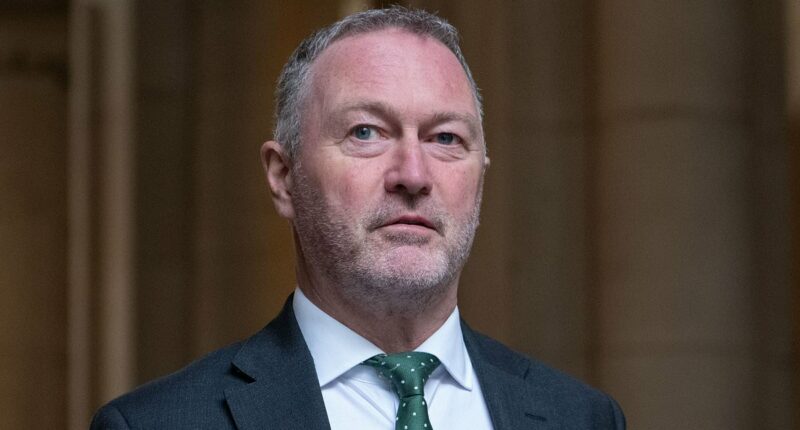Share this @internewscast.com
The Government has formally reached out to the first council in the UK to implement a four-day workweek, following concerns about declining service levels.
Communities Secretary Steve Reed conveyed his ‘deep disappointment’ in a letter addressed to South Cambridgeshire District Council leader Bridget Smith.
This district council became the pioneer among local authorities by launching a trial this summer where employees work 80% of their contracted hours. Despite working only four days a week, staff such as bin collectors and social housing officials continue to receive their full salaries.
The council anticipates annual savings of approximately £400,000, attributed to reduced staff turnover and a decreased dependence on agency workers.
Currently, an additional 25 councils are contemplating a similar approach, raising concerns about its impact on productivity and the burden on public finances.
In his letter to Ms. Smith, who leads South Cambridgeshire as a Liberal Democrat, Mr. Reed sought clarification following reports that council services might be deteriorating.
‘We’re not going to micromanage councils. We want to push power out of Whitehall,’ a source in the Communities Department told The Telegraph.
‘However, when we see unacceptable behaviour, we’ll call it out. Wasting taxpayer money in this fashion is completely unacceptable. Voters deserve the respect of a five-day week.’

Steve Reed, the Communities Secretary, expressed his ‘deep disappointment’ in a letter to the leader of South Cambridgeshire district council, Bridget Smith (pictured)

In leaked extracts of the letter, Mr Reed claimed a study found key housing-related services South Cambridgeshire had declined, ‘especially where vulnerable residents may be affected’
In leaked extracts of the letter, Mr Reed claimed a study found key housing-related services South Cambridgeshire had declined, ‘especially where vulnerable residents may be affected’.
He wrote: ‘The independent report shows that performance declined in key housing-related services, including rent collection, re-letting times, and tenant satisfaction with repairs, especially where vulnerable residents may be affected.
‘If social housing is being built by this Government, and your team are unable to move residents into them so that they are standing empty, then I must reiterate my deep disappointment with your conduct.’
Mr Reed added that he is ‘seeking assurance’ over the trial, which he pointed out was not government policy for local authorities to offer full-time pay for part-time work.
‘In particular, I would like to understand how the council is seeking to mitigate the impact to those services which have worsened over the course of the four-day working week trial,’ he wrote.
He added that he would like to meet with council office to ‘provide that assurance’.
South Cambridgeshire began a three-month pilot into the four-day week in January 2023 for 450 desk-based staff and claimed early checks indicated services were not affected, while employees were happier.
In May that year, it decided to continue the trial for another 12 months and extended it to cover binmen and cleaners.
The then Tory government wrote to the leader of the council Bridget Smith, demanding the experiment be terminated but it has continued regardless.
Figures released earlier this year in an independent report have shown that 16 per cent of staff do ‘other paid work’ on their extra day off – despite the council’s website stating the time off is to allow workers to ‘recover and re-energise’ for the ‘more intense’ four-day week.
The council claims most of those with second jobs are waste workers who traditionally took on other work when morning refuse collections were over.
Further research by the Universities of Salford, Bradford and Cambridge, which was referred to in the letter, found that 21 of 24 services improved or stayed the same using the four-day-week.
However a survey of residents revealed that nine out of 13 services have declined under the scheme, four stayed the same and none improved.
Ms Smith said she was ‘extremely disappointed’ to receive the letter as she claimed ‘we are an exceptionally high-performing council’.
The council leader added that they have ‘delivered an annual saving of almost £400,000, maintained and improved performance’.
She said the council has had seen their turnover decrease by 41 per cent and that number of applications for roles advertised has increased by 123 per cent.
A council spokesman said Ms Smith has agreed to hold a meeting with Mr Reed.
Elliot Keck, campaigns director of the TaxPayers’ Alliance, said: ‘South Cambridgeshire district council has inflicted a part-time council on its residents for years.
‘It has led to a decline in services and a shocking democratic deficit with councillors only voting on the scheme after years.
‘Steve Reed is right to be taking them to task and shouldn’t leave any option off the table in dealing with this rogue local authority.’

















